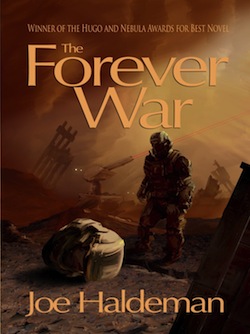 Why is it that some of the greatest sci-fi out there has everything to do with war?
Why is it that some of the greatest sci-fi out there has everything to do with war?
I’m thinking of “Star Wars,” “The Forever War,” “Old Man’s War,” “War of the Worlds,” for example (and those are just some of the ones with “war” in their titles). But also “Ender’s Game,” “Battlestar Galactica,” and so many video games, from “Space Invaders” to “Halo” and so many in between.
Here are some quick thoughts about possible reasons:
- Future weapons are cool: “Star Trek’s” photon torpedoes? The powered armor exoskeletons in “Starship Troopers”? The DNA-enhanced bodies of soldiers in “Old Man’s War”? Often when I think of the “speculative” in fiction, it is that kind of made-up stuff that rises to the top of my mind. Of course, you could say war is always pushing the boundaries of technology. After all, isn’t the Internet itself an outcome of war because it was developed by Defense Advanced Research Projects Agency?
- Paranoia strikes deep: In a lot of sci-fi, when the unknown makes itself known it can mean it is time to fight. The military violence in such classics as “War of the Worlds” and “Starship Troopers” are perfect examples of the kind of paranoia-inducing otherness that sees threats in difference.
- War can make for good storytelling: Fiction requires conflict, and few conflicts can be as extreme as war. Furthermore, war presents a useful storytelling structure: a series of events (a plot) that leads to a resolution (victory, defeat, stalemate). This is true for all kinds of stories, not just sci-fi.
- War is all-too human: This just follows from the previous point. For good or bad, we all know what war is. And because this is true, sci-fi set during war allows for new ways to think about what it means to be human: who are we? What is technology doing to us? One of my favorite aspects of “The Forever War” is how Joe Halderman uses time – of how a soldier’s subjective time of traveling across space can be only a few years, but be centuries on Earth. The novel then explores what that does to a person, about the relations they lose and the difficulties of gaining new relationships.
Of course, there are plenty of other things that humans share: love, wonder, a desire for adventure, a desire to laugh, a desire to return home.
I’m curious: When you think of your top sci-fi books, movies, and TV shows, how many on your lists are tied up in war? Why do you think war and sci-fi are always so closely connected?



Great topic! I think that you give very good reasons why war is such a big part of SF genre: it breeds conflict and therefore stories. A couple of my favorite TV shows are centered around war: Battlestar Galactica and Bablyon 5. And Star Trek: DS9 also had several wars during it’s run and Fringe had a very large scale war as the big plot. Also, if both sides are shown as “good” or “gray” it can be a good way to make conflict between likable people and therefore invoke moral questions.
LikeLike
Hi mervih — Great point about moral questions. I do think that the best war-related sci-fi (and maybe the best sci-fi in general) do raise issues about morals and ethics: is what we are doing for the good? How do these actions and technologies change what it means to be human?
A novel that gets in those questions in a very compelling way is Dan Simmons Hyperion — and so does his The Fall of Hyperion — which both feature great world-building, distinctive and relatable characters (often in conflict or at least suspicious of one another) all set in a time of war AND with some crazy killer godlike creature that seems to control time.
LikeLike
As much as I hate to agree with your first point, I really do. That’s why I love playing SF video games – because of all the future awesome weapons!
Also I think war is something we will, sadly, never escape from. So using that element in a story set thousands of years in the future ties it back to the modern day for the reader to relate to.
LikeLike